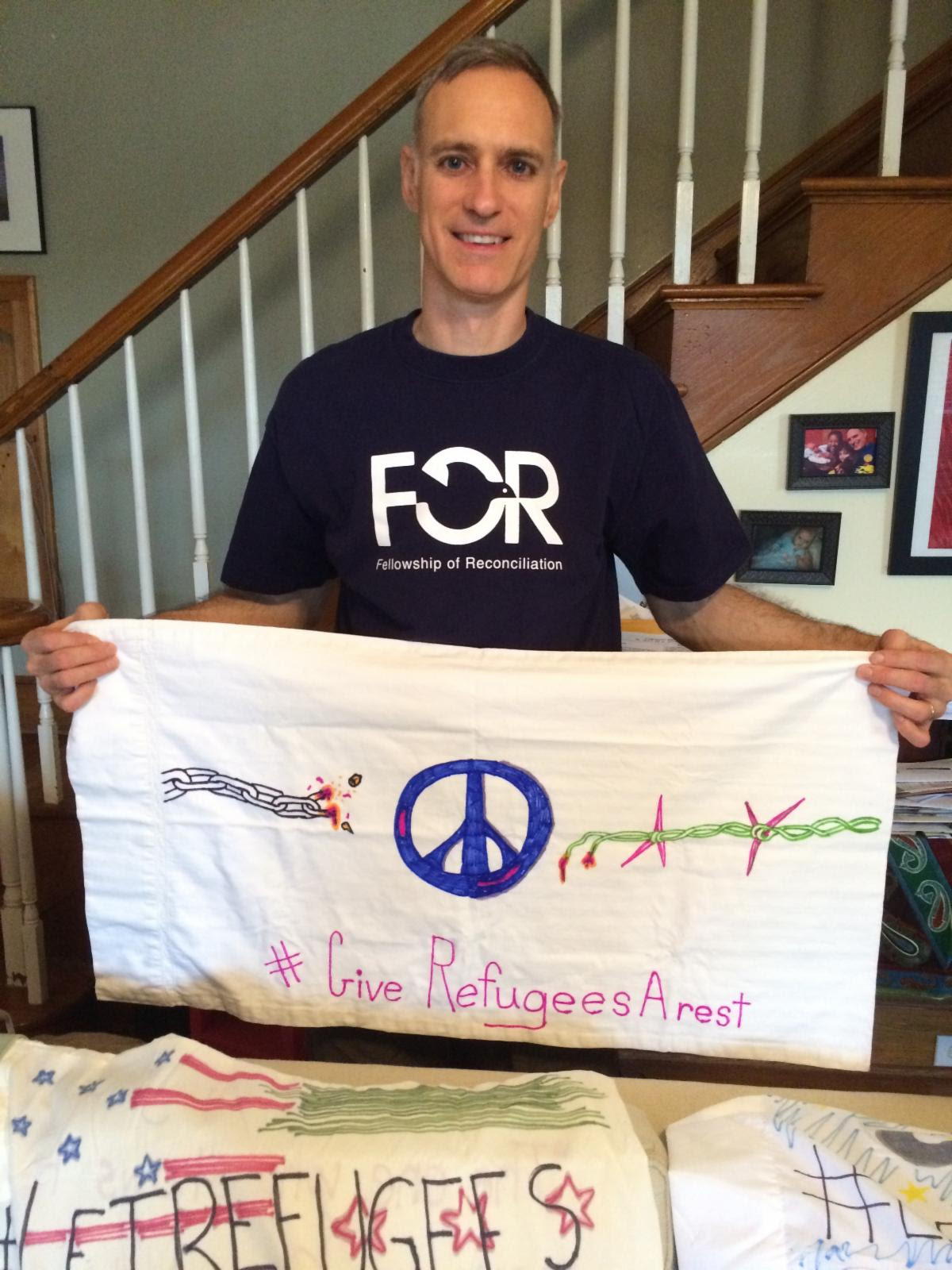
Perhaps a life interwoven with the Fellowship of Reconciliation was inevitable.
I was born in West Harlem in the summer of 1967, exactly three months after Rev. Dr. Martin Luther King delivered his legendary “Beyond Vietnam: A Time to Break Silence” sermon-speech to 3,000 members of Clergy and Laity Concerned, or CALC, at the Riverside Church in uptown New York City. My parents and I lived 30 blocks north of that grand cathedral of the Social Gospel movement, and I was baptized just a block away from its proud pulpit, in a Catholic parish, by a rabble-rousing iconoclastic poet-preacher named Daniel Berrigan. He wasn’t yet “a fugitive from injustice” as he later self- identified, when pursued by the F.B.I., but as I later learned, Berrigan was intimately involved with FOR – as the organization’s vice chair as well as co-founder of CALC, the Catholic Peace Fellowship and other FOR-sponsored initiatives.
The following year our family moved to Syracuse, where my dad attended graduate school and we joined a “house church” community of antiwar Catholics. Then in 1972, with my three-year-old sister in tow plus a baby on the way, we moved back downstate to Poughkeepsie, where I began kindergarten and our growing family began rooting ourselves in the local community.
My life was indelibly shaped by those growing-up years in Poughkeepsie. We attended Clearwater Sloop festivals along the Hudson River, where Pete and Toshi Seeger and other radical environmentalists led us in sing-along chants celebrating civil rights, creation care and creative peacemaking. We participated in food cooperatives and helped launch the Vassar Farm, a community- supported agriculture model that brought food to our tables. We attended racially-integrated public schools and pressed for culturally-competent education. We joined a downtown Episcopal parish that worked for economic justice at home, actively supported international human rights movements in South Africa and Central America, and helped relocate and welcome refugees from war-torn countries.
This foundation inspired a career in the faith-based justice sector, starting with an undergraduate internship at the Interfaith Center on Corporate Responsibility during the height of the global anti-apartheid movement. Following college, as the U.S.-led invasion of Iraq commenced in 1991, I joined the Episcopal Peace Fellowship and had my first introduction to FOR’s story and network. A dozen years later, thanks to EPF, I participated in an FOR interfaith delegation to Palestine, Israel, Jordan and Lebanon. Although I’d already traveled to the Holy Land twice, I was profoundly moved by FOR’s on-the-ground relationships and multifaceted approach to human rights accompaniment and solidarity.
I felt fortunate to be able to join the team in 2005; to work from FOR’s national office (then in Nyack, New York) for eight years; then later to join our decades-old “field operations” upon moving to Asheville, North Carolina, with my spouse Rima and our family. However, years of remote work have taken their toll, exacerbated by the isolation enforced during the COVID-19 pandemic. So, recognizing the significance of my family, congregation, and sense of place during my youth — and likewise during my formative later years in the San Francisco Bay area — I recently decided to reprioritize those core relationships at this stage of my life.
I am not saying farewell — “I’m not turning in my FOR T-shirt!” has been a mantra — and I’ll stay connected no matter what emerges as my next big step. For now, following a brief break in late 2023, I’ve accepted the generous invitation from Ariel, Susan and the team to consult with FOR as a “senior advisor” on important current projects, including our archives and historical knowledge, efforts to organize new grassroots chapters, and continuing to coordinate book reviews for Fellowship.
It has been an extraordinary gift to serve FOR and its sister justice movements throughout two decades on National Council and staff. I have been asked many times about the efficacy of our work as peacemakers. In addition to citing examples of FOR’s remarkably creative initiatives, I often found myself recalling my early life along the Hudson River. When our family moved to Poughkeepsie a half-century ago, that grand waterway was rife with industrial pollution; it was dangerous to swim or to eat its poisoned fish. Today, thanks to relentless organizing, education, and advocacy by grassroots activists, it is once again a sanctuary for diverse forms of life, art and food sustenance.
Thank you to everyone who has made my journey so remarkable and formative: for sharing your stories, for welcoming me into your homes, for being “angelic troublemakers” as Bayard Rustin urged us to be, for forgiving my mistakes, for opening my mind and heart to new visions of the possible. I hope to see you again at FOR’s 2024 planned summit in Atlanta, and to stay connected via social media. Meanwhile, my soul will remain centered on Dan Berrigan’s words written right around the time of my birth: “Love, love at the end.”